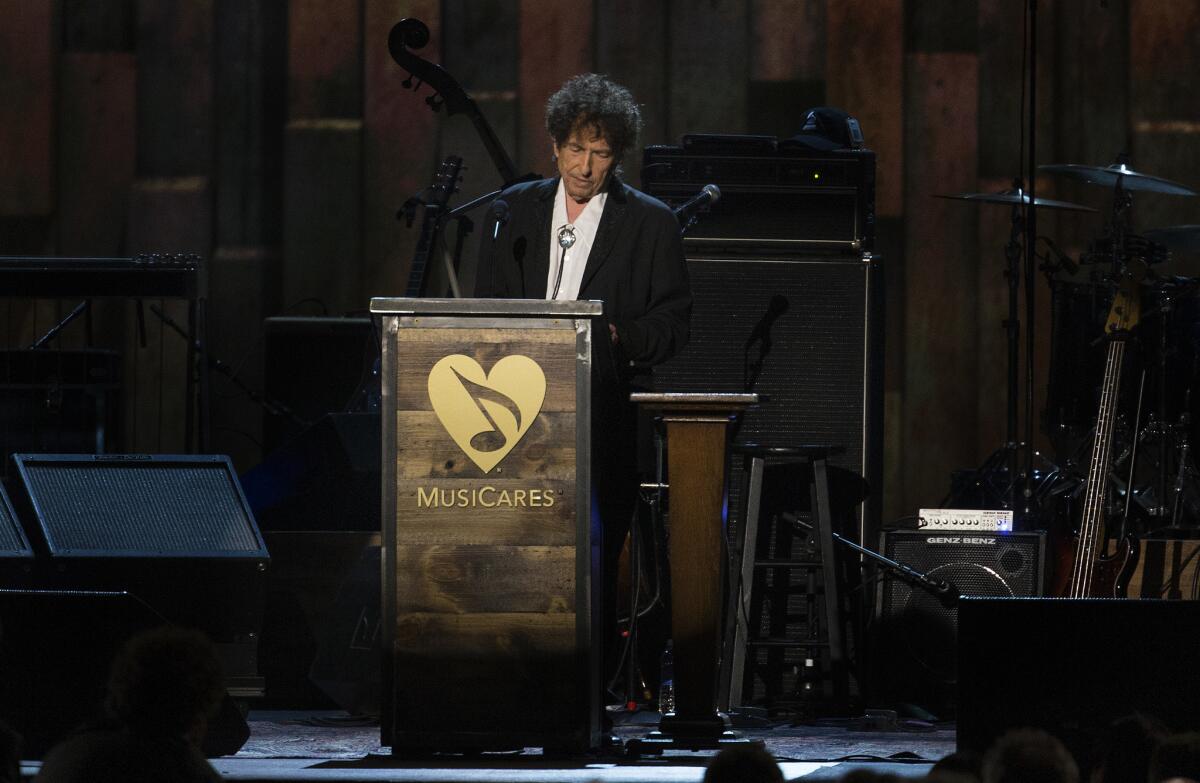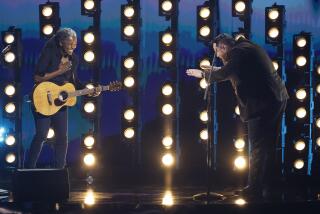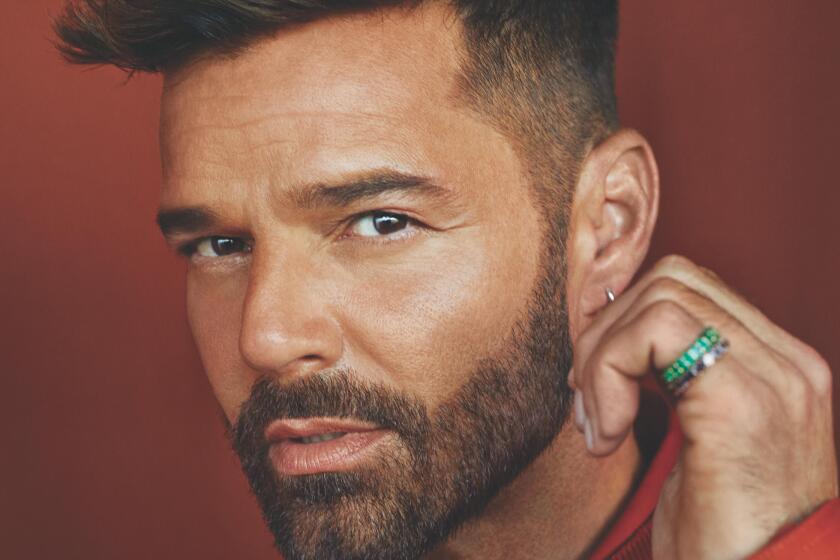Grammys 2015: Excerpts from Bob Dylan’s MusiCares acceptance speech

Bob Dylan, the 2015 MusiCares Person of the Year, speaks of his life and music to the crowd during the MusiCares concert at the Convention Center on Feb. 6, 2015, in Los Angeles.
After a dozen of versatile versions of his songs by artists including Bruce Springsteen, Bonnie Raitt, Jackson Browne, Beck, Norah Jones and others, Bob Dylan stood before a microphone at the MusiCares gala to accept his trophy for person of the year. The benefit, which helps musicians in times of need, occurred at the Los Angeles Convention Center and brought together thousands to honor Dylan.
Standing before the podium and gazing down at his notes like he was giving an eighth-grade book report, the artist thanked the organizers and then started reading. For the next 35 minutes Dylan, who seldom talks between songs onstage anymore, offered a range of thanks, thoughts, memories, acknowledgments and advice. He deconstructed the blues, offering a brief history of its origins. He talked rock ‘n’ roll, about a life consumed by it. He praised one-hit wonders, defended his voice, quoted unsung heroes.
Below, some excerpts from his acceptance speech. A review of the concert, as well as a transcript of this speech, will arrive shortly.
TRANSCRIPT: Read Bob Dylan’s full MusiCares acceptance speech
On his songs:
“These songs, they’re like mystery stories, the kind that Shakespeare saw when he was growing up. I think you could trace what I do back that far. They were on the fringes then, and I think they’re on the fringes now. And they sound like they’ve been on the hard ground.”
On Lou Levy of Leeds Music, Dylan’s first music publisher:
“He told me outright, there was no precedent for what I was doing, that I was either before my time or behind it. And if I gave him a song like ‘Stardust,’ he’d turn it down because it would be too late. He told me that if I was before my time -- and he didn’t really know that for sure, but if it was happening and if it was true -- the public would usually take three to five years to catch up. So be prepared. And that did happen. The trouble was, when the public did catch up I was already three to five years beyond that, so it [got] kinda complicated. But he was encouraging, and he didn’t judge me, and I’ll always remember him for that.”
On Peter, Paul & Mary’s early hit version of “Blowin’ in the Wind”:
“I didn’t even think of myself as writing songs for others to sing, but it was starting to happen and it couldn’t have happened to, or with, a better group. They took a song of mine that hadn’t been recorded before that was buried on one of my records and turned it into a hit song. Not the way I would have done it -- they straightened it out. But since then hundreds of people have recorded it and I don’t think that would have happened if it wasn’t for them. They definitely started something for me.”
FULL COVERAGE: Grammy Awards 2015
On Dylan’s commercial hits for other artists:
“The Byrds, the Turtles, Sonny & Cher -- they made some of my songs top 10 hits, but I wasn’t a pop songwriter and I really didn’t want to be that, but it was good that it happened. Their versions of songs were like commercials, but I didn’t really mind that because 50 years later my songs were being used in commercials. So that was good too. I was glad it happened, and I was glad they’d done it.”
On Johnny Cash, artistic license and inspiration:
“Johnny Cash recorded some of my songs early on, too, up in about ’62 or ‘63, when he was all skin and bones. He traveled long, he traveled hard, but he was a hero of mine. I heard many of his songs growing up. I knew them better than I knew my own. ‘Big River,’ ‘I Walk the Line.’
“‘How high’s the water mama?’ I wrote ‘It’s All Right Ma, I’m Only Bleeding’ with that song reverberating inside my head. I still ask, ‘How high is the water, mama.’ Johnny was an intense character, and he saw that people were putting me down playing electric music, and he posted letters to magazines scolding people, telling them to shut up and let him sing. In Johnny Cash’s world -- hard core Southern drama -- that kind of thing didn’t exist. Nobody told anybody what to sing or what to not to sing. They just didn’t do that kind of thing. I’m always gonna thank him for that. Johnny Cash was a giant of a man, the man in black. And I’ll always cherish the friendship we had until the day there is no more days.
On Dylan’s writing influences:
“These songs didn’t come out of thin air. I didn’t just make them up out of whole cloth. Contrary to what [publisher] Lou Levy said, there was a precedent. It all came out of traditional music: traditional folk music, traditional rock ‘n’ roll and traditional big band swing orchestra music.
“I learned lyrics and how to write them from listening to folk songs. And I played them, and I met other people that played them back when nobody was doing it. Sang nothing but these folk songs, and they gave me the code for everything that’s fair game. That everything belongs to everyone.
NOMINEE INTERVIEWS: Beck | Sam Smith | Jhene Aiko | Erica Campbell | Bernhoft | Zhu
“For three or four years all I listened to were folk standards. I went to sleep singing folk songs. I sang them everywhere, clubs, parties, bars, coffeehouses, fields, festivals. And I met other singers along the way who did the same thing and we just learned songs from each other. I could learn a song and next sing it in an hour if I’d heard it just once.
“If you sang ‘John Henry’ as many times as me --’John Henry was a steel-driving man, died with a hammer in his hand. John Henry said a man ain’t nothin’ but a man. Before I let that steam drill drive me down I’ll die with that hammer in my hand.’ If you had sang that song as many times as I did, you’d have written ‘How many roads must a man walk down’ too.”
Stay tuned for more.
Follow Randall Roberts on Twitter: @liledit
More to Read
The biggest entertainment stories
Get our big stories about Hollywood, film, television, music, arts, culture and more right in your inbox as soon as they publish.
You may occasionally receive promotional content from the Los Angeles Times.







